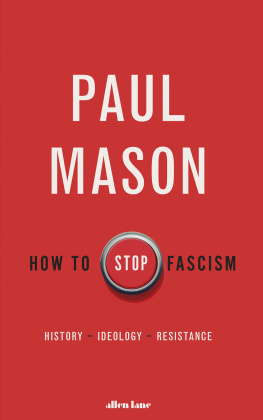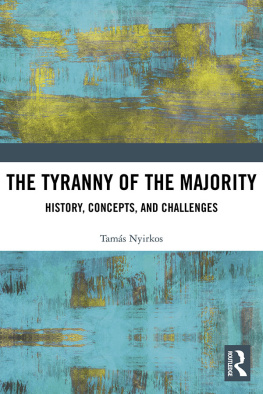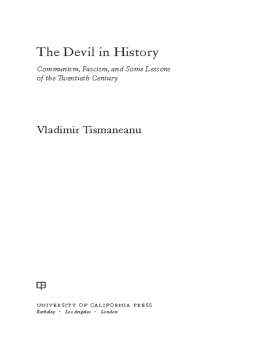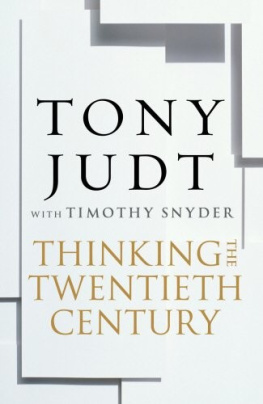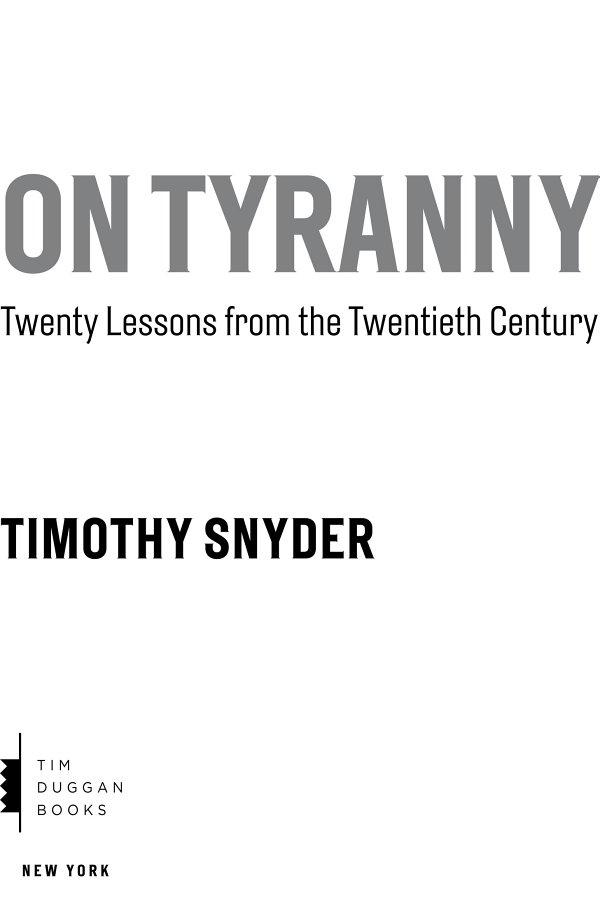A LSO BY T IMOTHY S NYDER
Nationalism, Marxism, and Modern Central Europe: A Biography of Kazimierz Kelles-Krauz (18721905)
Wall Around the West: State Borders and Immigration Controls in the United States and Europe (ed. with Peter Andreas)
The Reconstruction of Nations: Poland, Ukraine, Lithuania, Belarus, 19591999
Sketches from a Secret War: A Polish Artists Mission to Liberate Soviet Ukraine
The Red Prince: The Secret Lives of a Habsburg Archduke
Bloodlands: Europe Between Hitler and Stalin
Thinking the Twentieth Century (with Tony Judt)
Stalin and Europe: Imitation and Domination, 19281953 (ed. with Ray Brandon)
Ukrainian History, Russian Policy, and European Futures (in Russian and Ukrainian)
The Politics of Life and Death (in Czech)
The Balkans as Europe: The Nineteenth Century (ed. with Katherine Younger)
Black Earth: The Holocaust as History and Warning
Copyright 2017 by Timothy Snyder
All rights reserved.
Published in the United States by Tim Duggan Books, an imprint of the Crown Publishing Group, a division of Penguin Random House LLC, New York.
timdugganbooks.com
TIM DUGGAN BOOKS and the Crown colophon are trademarks of Penguin Random House LLC.
Library of Congress Cataloging-in-Publication Data is available upon request.
ISBN9780804190114
Ebook ISBN9780804190121
Cover design by Christopher Brand
v4.1_r1
ep
In politics, being deceived is no excuse.
LESZEK KOAKOWSKI
History does not repeat, but it does instruct. As the Founding Fathers debated our Constitution, they took instruction from the history they knew. Concerned that the democratic republic they envisioned would collapse, they contemplated the descent of ancient democracies and republics into oligarchy and empire. As they knew, Aristotle warned that inequality brought instability, while Plato believed that demagogues exploited free speech to install themselves as tyrants. In founding a democratic republic upon law and establishing a system of checks and balances, the Founding Fathers sought to avoid the evil that they, like the ancient philosophers, called tyranny. They had in mind the usurpation of power by a single individual or group, or the circumvention of law by rulers for their own benefit. Much of the succeeding political debate in the United States has concerned the problem of tyranny within American society: over slaves and women, for example.
It is thus a primary American tradition to consider history when our political order seems imperiled. If we worry today that the American experiment is threatened by tyranny, we can follow the example of the Founding Fathers and contemplate the history of other democracies and republics. The good news is that we can draw upon more recent and relevant examples than ancient Greece and Rome. The bad news is that the history of modern democracy is also one of decline and fall. Since the American colonies declared their independence from a British monarchy that the Founders deemed tyrannical, European history has seen three major democratic moments: after the First World War in 1918, after the Second World War in 1945, and after the end of communism in 1989. Many of the democracies founded at these junctures failed, in circumstances that in some important respects resemble our own.
History can familiarize, and it can warn. In the late nineteenth century, just as in the late twentieth century, the expansion of global trade generated expectations of progress. In the early twentieth century, as in the early twenty-first, these hopes were challenged by new visions of mass politics in which a leader or a party claimed to directly represent the will of the people. European democracies collapsed into right-wing authoritarianism and fascism in the 1920s and 30s. The communist Soviet Union, established in 1922, extended its model into Europe in the 1940s. The European history of the twentieth century shows us that societies can break, democracies can fall, ethics can collapse, and ordinary men can find themselves standing over death pits with guns in their hands. It would serve us well today to understand why.
Both fascism and communism were responses to globalization: to the real and perceived inequalities it created, and the apparent helplessness of the democracies in addressing them. Fascists rejected reason in the name of will, denying objective truth in favor of a glorious myth articulated by leaders who claimed to give voice to the people. They put a face on globalization, arguing that its complex challenges were the result of a conspiracy against the nation. Fascists ruled for a decade or two, leaving behind an intact intellectual legacy that grows more relevant by the day. Communists ruled for longer, for nearly seven decades in the Soviet Union, and more than four decades in much of eastern Europe. They proposed rule by a disciplined party elite with a monopoly on reason that would guide society toward a certain future according to supposedly fixed laws of history.
We might be tempted to think that our democratic heritage automatically protects us from such threats. This is a misguided reflex. In fact, the precedent set by the Founders demands that we examine history to understand the deep sources of tyranny, and to consider the proper responses to it. Americans today are no wiser than the Europeans who saw democracy yield to fascism, Nazism, or communism in the twentieth century. Our one advantage is that we might learn from their experience. Now is a good time to do so.
This book presents twenty lessons from the twentieth century, adapted to the circumstances of today.
1
Do not obey in advance.
Most of the power of authoritarianism is freely given. In times like these, individuals think ahead about what a more repressive government will want, and then offer themselves without being asked. A citizen who adapts in this way is teaching power what it can do.
A nticipatory obedience is a political tragedy. Perhaps rulers did not initially know that citizens were willing to compromise this value or that principle. Perhaps a new regime did not at first have the direct means of influencing citizens one way or another. After the German elections of 1932, which permitted Adolf Hitler to form a government, or the Czechoslovak elections of 1946, where communists were victorious, the next crucial step was anticipatory obedience. Because enough people in both cases voluntarily extended their services to the new leaders, Nazis and communists alike realized that they could move quickly toward a full regime change. The first heedless acts of conformity could not then be reversed.
In early 1938, Adolf Hitler, by then securely in power in Germany, was threatening to annex neighboring Austria. After the Austrian chancellor conceded, it was the Austrians anticipatory obedience that decided the fate of Austrian Jews. Local Austrian Nazis captured Jews and forced them to scrub the streets to remove symbols of independent Austria. Crucially, people who were not Nazis looked on with interest and amusement. Nazis who had kept lists of Jewish property stole what they could. Crucially, others who were not Nazis joined in the theft. As the political theorist Hannah Arendt remembered, when German troops invaded the country and Gentile neighbors started riots at Jewish homes, Austrian Jews began to commit suicide.






